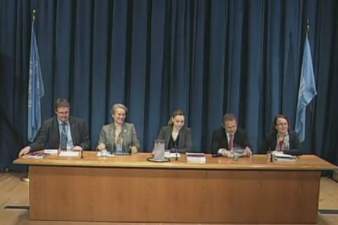Dr. Grobicki noted that while some 80% of countries are making progress, only one-third are actually implementing their plans. She also said that countries need financial strategies to ensure that these plans become reality. Implementing the plans are all the more important today, she noted, because of the increase in extreme climate events, floods, and droughts.Other participants in the press conference on March 22, 2012, included Rolf Luyendijk, Senior Statistics and Monitoring Specialist, Statistics and Monitoring Section, UNICEF, Ana Persic, Science Programme Specialist, UNESCO, and Csaba Korosi, Permanent Representative of Hungary to the United Nations.
Later in the day, Dr. Grobicki participated in the Side Event, “From World Water Day 2012 ‘Water and Food Security’ to the International Year of Water Cooperation 2013,” co-organized by the Permanent Mission of Tajikistan, the UN Food and Agriculture Organization (FAO) and UN-Water.
Dr. Grobicki emphasized the importance of the three “Is”: Information, Institutions, and Investments. Improving the collection of water and climate information will help in identifying vulnerable "hotspots" — arid regions, areas reliant on shrinking water resources, small island developing states and low-lying deltas. Strengthening water management institutions, transparent regulatory frameworks, and multi-stakeholder dialogues, will result in innovative, local solutions that can contribute to disaster risk reduction. And prioritising investments, in water resources management delivers immediate benefits today as well as longer-term social, economic and environmental resilience.

